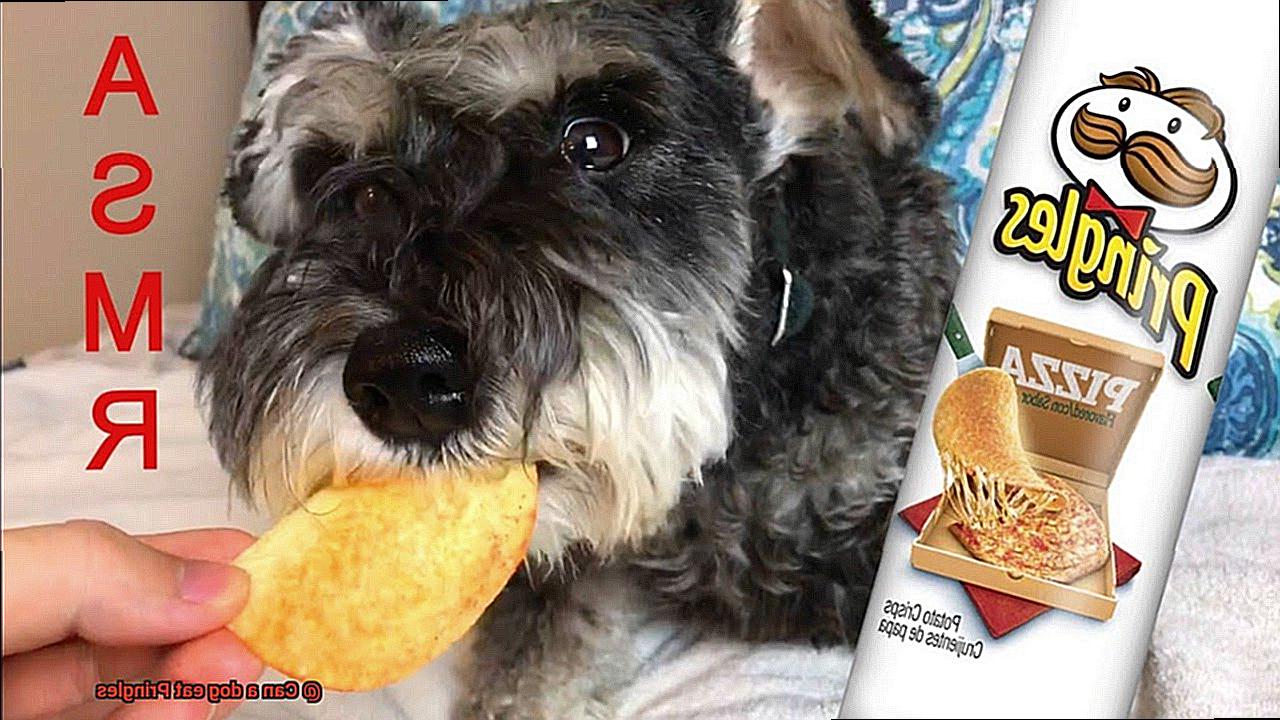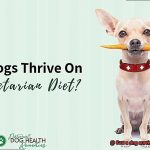Can a dog eat Pringles?
We’ve all been there, faced with those irresistible puppy-dog eyes begging for a taste of our snacks. It’s hard to resist, but as responsible pet owners, we need to put our furry friends’ health first. Today, we’re diving into the world of Pringles, that iconic stackable snack, to determine whether it’s safe for our canine companions.
While Pringles may satisfy our cravings in a crunch, it’s crucial to weigh the potential consequences before sharing a chip with your four-legged buddy. Join us as we uncover the ups and downs of feeding Pringles to your pup, so you can make an informed decision that keeps their well-being front and center.
What Are the Health Risks of Feeding Pringles to Dogs?
Contents
- 1 What Are the Health Risks of Feeding Pringles to Dogs?
- 2 What Should You Do If Your Dog Accidentally Eats Pringles?
- 3 How Can You Tell If Your Dog Is Having a Negative Reaction to Pringles?
- 4 Is There a Safer Alternative to Pringles for Dogs?
- 5 How Do You Know If a Food Is Safe for Your Dog?
- 6 What Other Human Foods Should Be Avoided When Feeding Dogs?
- 7 What Nutrients Does a Balanced Diet Include for Dogs?
- 8 How Can You Ensure That Your French Bulldog Gets All the Nutrition It Needs?
- 9 Conclusion
French Bulldogs are adorable and beloved companions known for their playful and affectionate nature. As pet owners, we strive to provide them with the best care, including a balanced and nutritious diet.
However, it can be tempting to share our favorite snacks with our furry friends. One such snack that may catch your eye is Pringles. But, can French Bulldogs eat Pringles? Let’s delve into the health risks associated with feeding Pringles to dogs.
High Salt Content: A Recipe for Disaster
Pringles, like most potato chips, are seasoned with a significant amount of salt. While a small amount of salt is essential for a dog’s diet, excessive intake can lead to health issues. Dogs are more sensitive to salt than humans, and too much salt can cause dehydration, electrolyte imbalances, and kidney damage. French Bulldogs are prone to certain health conditions, such as kidney disease, so it is crucial to avoid exposing them to unnecessary risks.
Artificial Flavorings and Additives: A Recipe for Trouble
Another concern with Pringles is the artificial flavorings and additives they contain. Ingredients like monosodium glutamate (MSG) and artificial preservatives can trigger adverse reactions in dogs. Digestive upset, allergic reactions, and even behavioral changes can occur after consuming these additives. French Bulldogs already have sensitive stomachs, so it’s best to steer clear of any potential irritants.
High Fat Content: A Recipe for Weight Gain
French Bulldogs have a tendency to gain weight easily, making them more susceptible to obesity-related health problems. Unfortunately, Pringles are high in fat content, which can contribute to weight gain and increase the risk of pancreatitis—a painful inflammation of the pancreas. Pancreatitis can cause severe abdominal pain and digestive issues for your furry friend.
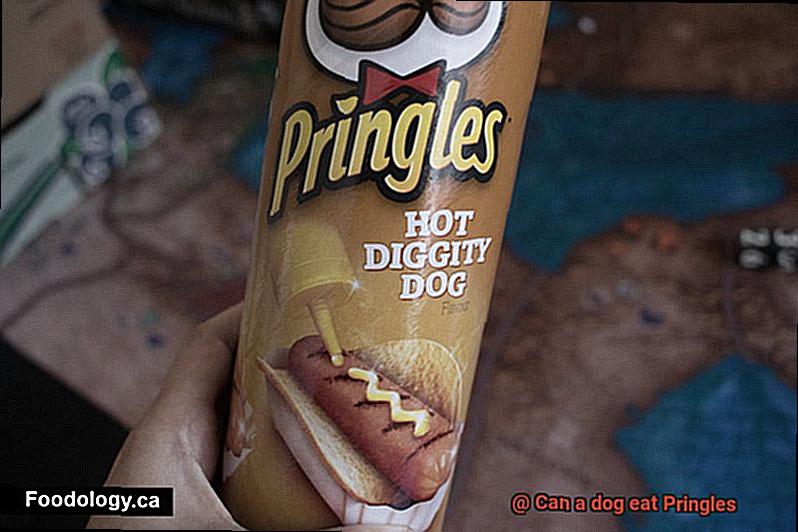
Choking Hazard: A Recipe for Disaster
The unique shape and texture of Pringles can pose a choking hazard for French Bulldogs. Their curved shape and hard consistency make them difficult for dogs to chew and swallow properly. This increases the risk of choking or getting the chip lodged in their throat or gastrointestinal tract. As responsible pet owners, it is crucial to avoid any potential threats to our furry friends’ well-being.
Nutritional Deficiencies: A Recipe for Poor Health
Pringles are not formulated or intended as dog food. They lack the necessary nutrients and vitamins that French Bulldogs need to thrive. Feeding your French Bulldog Pringles instead of a balanced diet can lead to nutritional deficiencies over time, compromising their overall health and well-being.
What Should You Do If Your Dog Accidentally Eats Pringles?
Picture this: you’re enjoying a movie night with your furry best friend by your side. You reach for a can of Pringles and, in a moment of distraction, your dog snatches one right out of your hand.
First things first, stay calm. Panicking will only stress your dog further, and that’s the last thing you want. Take a deep breath and assess the situation. How many Pringles did your dog consume? Did they also eat any packaging or wrappers? These details will be important when you contact your veterinarian.
Speaking of which, that’s your next step – call your vet. They are the experts when it comes to your dog’s health, and they will be able to provide guidance based on your dog’s size, weight, and overall health. Every dog is different, so it’s crucial to consult with a professional for personalized advice.
While waiting for the vet’s instructions, keep a close eye on your pup. Look out for any changes in behavior, appetite, or bowel movements. It’s also essential to provide fresh water to keep them hydrated.
In some cases, your vet may recommend inducing vomiting to remove any potential toxins from your dog’s system. However, this should only be done under their guidance and supervision.
Avoid giving your dog any additional food or treats until you have consulted with your veterinarian. They may recommend withholding food for a certain period or transitioning them to a bland diet temporarily.
Prevention is key. To avoid future incidents, make sure to keep potentially harmful snacks like Pringles out of reach from your dog. Store them in secure containers or cabinets that cannot be easily accessed by your furry friend.
Remember, the severity of the situation can vary depending on various factors such as the size of your dog and the amount consumed. Trust your veterinarian’s expertise and follow their recommendations to ensure the safety and well-being of your pet.
How Can You Tell If Your Dog Is Having a Negative Reaction to Pringles?
We all know that our four-legged friends can be quite the sneaky snack stealers. But what happens when your Frenchie gets their paws on a Pringle? Is it cause for concern? Well, let’s dig in and find out.
First things first, it’s important to remember that not all dogs will have the same reaction to Pringles. Some may be able to handle the salty crunch without any issues, while others may experience some less-than-pleasant symptoms. So, it’s crucial to keep an eye out for any signs that your pup might be having a negative reaction.
One telltale sign is digestive issues. If your dog starts vomiting or having diarrhea shortly after devouring a Pringle, it’s a good indicator that their tummy isn’t too happy with the salty treat. Excessive gas or an upset stomach can also be red flags. Remember, you know your Frenchie best, so trust your gut (pun intended) if something seems off.
Another thing to watch out for is a sudden decrease in energy levels. If your usually energetic pooch seems extra tired or sluggish after indulging in a Pringle, it might be time to put the chips away. Lethargy can be a sign that something isn’t sitting well with their system, so it’s best to consult with your vet if this behavior persists.
Now, let’s talk allergies. Just like humans, dogs can develop allergies to certain foods, including Pringles. If your Frenchie starts itching, develops redness or swelling of the skin, breaks out in hives, or has difficulty breathing after chowing down on some chips, it’s crucial to take these signs seriously and seek immediate veterinary attention.
Behavioral changes can also clue you in on whether your dog is having a negative reaction to Pringles. Some pups may become hyperactive or restless, while others may show signs of agitation or irritability. If your Frenchie’s behavior seems out of character after munching on chips, it’s best to consult with your vet to rule out any adverse reactions.
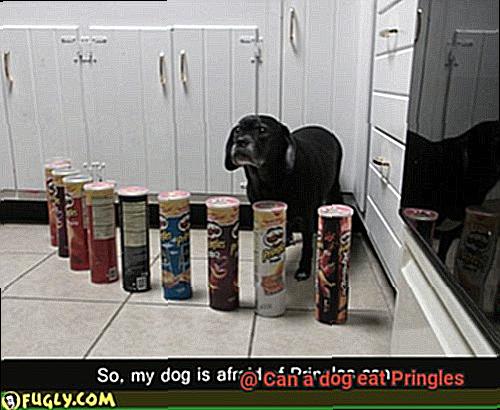
Lastly, keep an eye on their water intake. If your dog starts guzzling down water like it’s going out of style after scarfing down some Pringles, it could be a sign of dehydration or kidney-related issues. Make sure to monitor their water intake and reach out to your vet if this behavior continues.
Now, I know it’s tough to resist those puppy dog eyes when they’re begging for a Pringle, but remember that prevention is always better than cure. It’s best to avoid feeding Pringles to your furry friend altogether and stick to a balanced and nutritious diet specifically formulated for dogs. And as always, if you have any concerns about your Frenchie’s diet or potential food allergies, don’t hesitate to consult with your vet.
Is There a Safer Alternative to Pringles for Dogs?
As a French Bulldog owner, you want to treat your furry friend to delicious snacks without compromising their health. Unfortunately, Pringles are not a safe option for dogs due to their high salt content and artificial flavors.
There are plenty of safer alternatives that will satisfy your pup’s cravings and keep them happy and healthy. Let’s take a closer look at these alternatives:
Plain Popcorn:
Popcorn can be a great alternative to Pringles as long as it is air-popped and doesn’t contain any seasoning or butter. It provides a satisfying crunch and is low in calories. Just make sure to remove any unpopped kernels that could pose a choking hazard.
Sliced Fruits and Vegetables:

Fruits like apples, bananas, and watermelon can be given to dogs in moderation as a healthy snack. They are packed with vitamins and natural sweetness that dogs love. Vegetables like carrots, green beans, and sweet potatoes are also excellent options as they are low-calorie and provide essential nutrients.
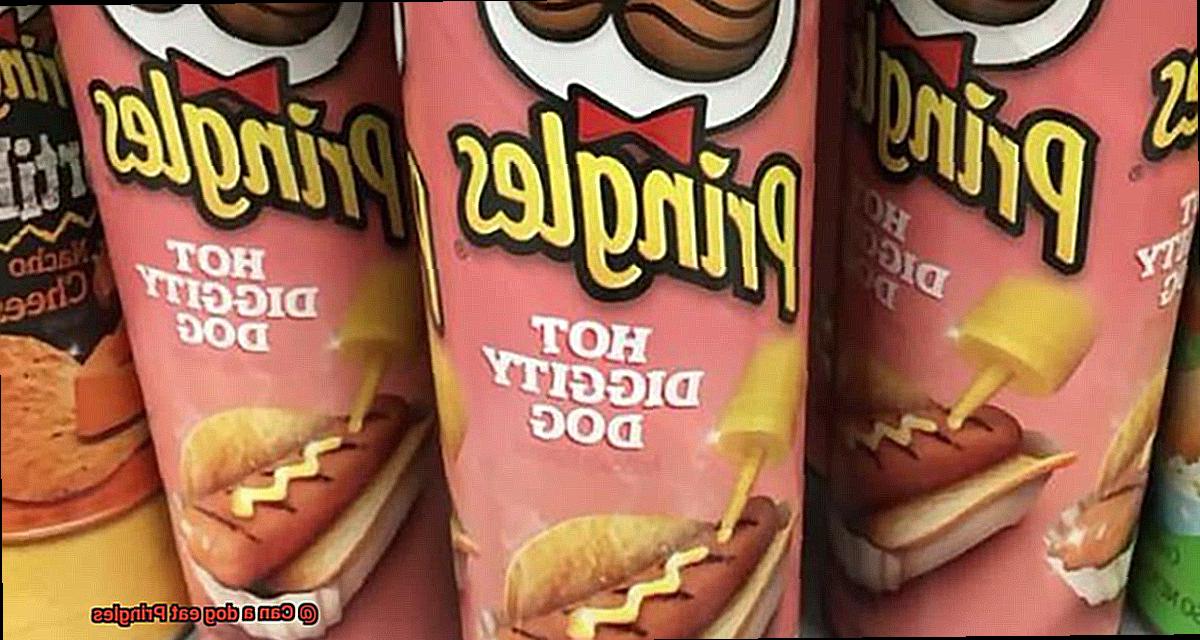
However, it is important to avoid giving dogs any fruits or vegetables that are toxic to them, such as grapes, raisins, onions, garlic, or avocados. Always do your research or consult with your veterinarian before introducing new foods into your dog’s diet.
Homemade Dog-Friendly Treats:
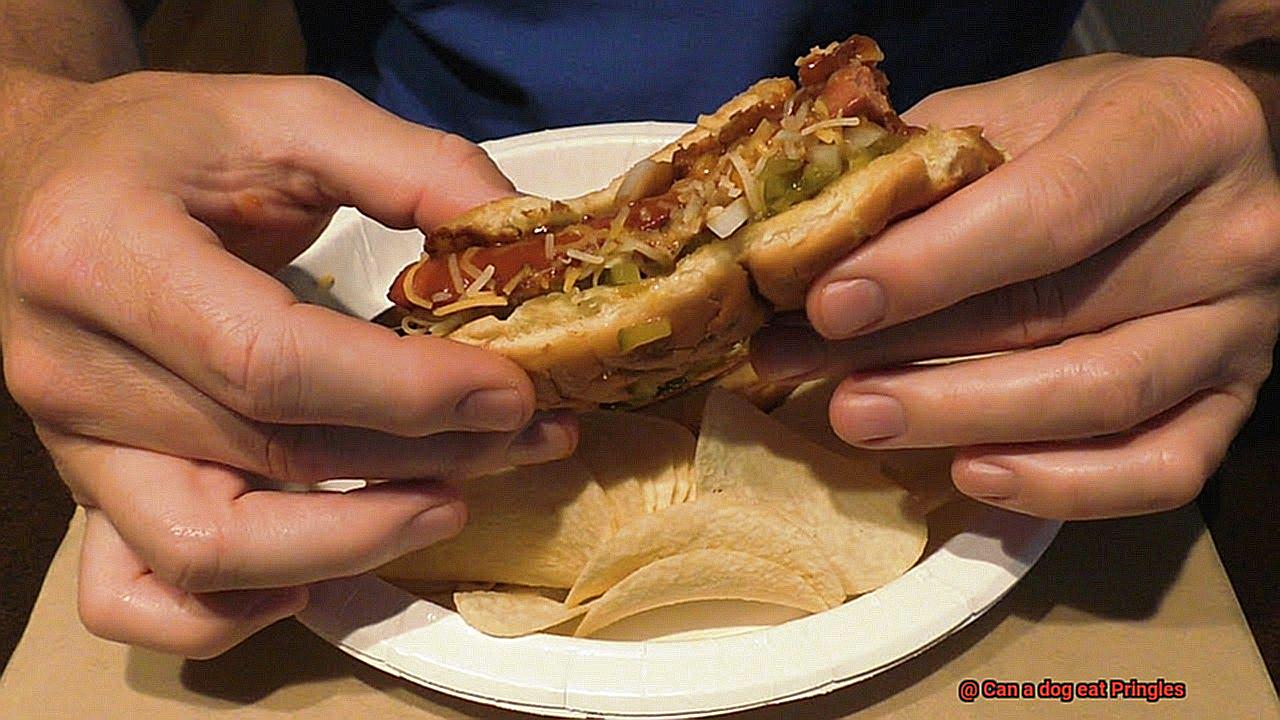
If you’re feeling creative, why not try making homemade dog treats? This way, you have complete control over the ingredients and can ensure they are safe for your French Bulldog. There are countless recipes online using dog-friendly ingredients like peanut butter, pumpkin puree, oats, or chicken broth. Just make sure to avoid using any ingredients that may be harmful to dogs.
Remember, when offering any new food to your dog, it’s crucial to introduce it gradually and in small quantities to ensure they tolerate it well. Every dog is unique, and some may have sensitivities or allergies to certain ingredients. Consulting with your veterinarian is always recommended before introducing any new food into your dog’s diet.
How Do You Know If a Food Is Safe for Your Dog?
Our furry friends are part of the family, and just like our human loved ones, we want to make sure they are eating foods that are safe and healthy for them. But with so many options out there, how do you know if a food is safe for your dog? Here are some tips to help you determine if a food is suitable for your French Bulldog.
Consult with Your Veterinarian
When it comes to your dog’s health and nutrition, your veterinarian is your best resource. They can provide expert advice based on your dog’s individual needs and any specific health concerns they may have. Whether you’re wondering if Pringles are safe for your pup or if there are any other foods you should avoid, your vet will be able to guide you in the right direction.
Educate Yourself about Toxic Foods
Certain foods that are safe for humans can be toxic or harmful to dogs. Chocolate, grapes, onions, and garlic are just a few examples of foods that should never be given to dogs. Familiarize yourself with these potentially dangerous foods so you can make informed decisions when it comes to feeding your French Bulldog.
Check the ASPCA Website
The American Society for the Prevention of Cruelty to Animals (ASPCA) is another valuable resource when it comes to determining the safety of certain foods for dogs. They provide a comprehensive list of human foods that are toxic to dogs, as well as information on what to do if your dog accidentally ingests something harmful. Checking their website or consulting their hotline can help ensure the safety of your furry friend.
Read Labels and Ingredient Lists
When choosing commercial dog food or treats, reading labels and ingredient lists is crucial. Look out for ingredients that may be harmful or difficult for dogs to digest. Avoid foods that contain artificial sweeteners like xylitol, as they can be highly toxic to dogs.
Monitor Your Dog’s Reaction
Every dog is different, so it’s important to monitor your French Bulldog’s reaction to new foods. If you decide to give them a small amount of Pringles as a treat, observe how they react immediately after eating and in the hours that follow. Look out for any signs of discomfort, digestive issues, or allergic reactions. If you notice any adverse effects, it’s best to avoid giving your dog Pringles in the future.
What Other Human Foods Should Be Avoided When Feeding Dogs?
While it’s tempting to share our favorite human foods with our beloved pets, some foods can be harmful or even toxic to dogs. In this article, we’ll explore some common human foods that should be avoided when feeding French Bulldogs, keeping their health and safety in mind.
Chocolate:
Chocolate is a delicious treat for us, but it contains theobromine, a substance that is toxic to dogs. Even small amounts of chocolate can cause symptoms like vomiting, diarrhea, increased heart rate, and seizures in French Bulldogs. Dark chocolate and baker’s chocolate have higher theobromine content, making them even more dangerous.
Grapes and raisins:
Grapes and raisins have been known to cause kidney failure in dogs, including French Bulldogs. The exact reason behind this toxicity is still unclear, so it’s best to avoid feeding these fruits to your furry friend altogether.
Onions and garlic:
Onions and garlic may add flavor to our dishes, but they contain compounds that can damage a dog’s red blood cells, leading to anemia. French Bulldogs are particularly susceptible to this toxicity due to their unique physiology. Be cautious of ingredients containing onions or garlic in soups, sauces, and seasonings.
Avocado:
Avocado is a popular superfood for humans, but it contains persin, a substance that can be toxic to dogs in large quantities. While the flesh of an avocado is generally safe for French Bulldogs, it’s best to avoid feeding them the skin, pit, and leaves as these parts contain higher concentrations of persin.
Alcohol:
Alcohol is highly toxic to dogs and should never be given intentionally. Even small amounts can cause severe intoxication, liver damage, and even death. Keep all alcoholic beverages out of your French Bulldog’s reach.
Xylitol:
Xylitol is a sugar substitute found in many sugar-free candies, gums, and even some peanut butter brands. It can cause a rapid release of insulin in dogs, leading to low blood sugar levels. Be cautious and read ingredient labels carefully to ensure the safety of your French Bulldog.
Macadamia nuts:
Macadamia nuts are toxic to dogs and can cause weakness, tremors, vomiting, and increased body temperature. Avoid feeding any foods containing macadamia nuts to your French Bulldog.
Caffeine:
Caffeine, found in coffee, tea, energy drinks, and other caffeinated beverages, is a stimulant that can be toxic to dogs. It can cause restlessness, increased heart rate, tremors, and even seizures. Keep these beverages away from your French Bulldog.
What Nutrients Does a Balanced Diet Include for Dogs?
When it comes to providing a balanced diet for your French Bulldog, it’s important to ensure they receive all the essential nutrients their bodies need. Just like humans, dogs require a variety of nutrients to support their overall health and well-being. Let’s take a closer look at the key nutrients that should be included in a balanced diet for dogs.
Proteins: The Building Blocks of Life
Proteins are essential for dogs as they provide the necessary amino acids that are the building blocks of their bodies. Good sources of proteins for your French Bulldog include meat, fish, eggs, and dairy products. These proteins help support muscle development, repair tissues, and provide energy.
Carbohydrates: Fuel for Energy
Carbohydrates are an important source of energy for dogs. They can be obtained from sources like grains, vegetables, and fruits. However, it’s crucial to choose complex carbohydrates that are rich in fiber rather than simple sugars. Complex carbohydrates provide sustained energy and help regulate blood sugar levels.
Fats: Healthy Fats for a Healthy Dog
Fats are necessary for a dog’s overall health, as they provide energy and help in the absorption of fat-soluble vitamins. Healthy fats can be found in foods like fish oil, flaxseed oil, and olive oil. These fats support skin and coat health, promote brain function, and aid in hormone production.
Vitamins: The Superheroes of Nutrition
Vitamins play a vital role in a dog’s diet, supporting various bodily functions. Some important vitamins for your French Bulldog include vitamin A, vitamin D, vitamin E, and B vitamins. These vitamins can be obtained from a balanced diet or through supplements if recommended by your veterinarian. Vitamin A promotes healthy vision and immune function, while vitamin D supports calcium absorption and bone health.
Minerals: The Foundation of Health
Minerals are essential for dogs to maintain healthy bones, teeth, and overall body function. Sources of minerals include meat, whole grains, vegetables, and fruits. Calcium, phosphorus, and magnesium are crucial for strong bones and teeth, while iron helps transport oxygen in the bloodstream.
Water: The Elixir of Life
In addition to these essential nutrients, a balanced diet should also include an adequate amount of water. Water is vital for keeping your French Bulldog hydrated and supporting proper digestion.
It’s important to note that the specific nutrient requirements may vary depending on factors like your dog’s age, breed, size, activity level, and any existing health conditions. Consulting with your veterinarian is crucial to determine the specific nutrient needs of your French Bulldog and ensure you provide a well-balanced diet that meets those requirements.
How Can You Ensure That Your French Bulldog Gets All the Nutrition It Needs?
If you’re wondering how to keep your furry friend healthy and full of energy, look no further. This guide will equip you with all the tips and tricks you need to ensure your French Bulldog gets all the nutrition it needs for a vibrant life.
Protein Powerhouse:
Protein is the superhero of nutrients for your French Bulldog. It helps build and repair muscles, supports a strong immune system, and keeps their coat shiny. Opt for lean meats like chicken and turkey, fish, eggs, and dairy products to provide a quality protein source. Remember, a healthy bulldog is a happy bulldog.
Carb-Up for Energy:
Just like humans need fuel to power through the day, French Bulldogs need carbohydrates for energy. Choose complex carbs such as rice, oats, sweet potatoes, carrots, and fruits like apples and blueberries. These will provide a steady release of energy throughout the day, keeping your little superhero active and ready for adventures.
Fats: The Super Fuel:
While too much fat can lead to health issues, the right amount is essential for your French Bulldog’s well-being. Healthy fats found in fish oil, flaxseed oil, and coconut oil help maintain a lustrous coat, support brain function, and aid nutrient absorption. Remember, it’s all about balance – moderate fat intake is key.
Micronutrient Magic:
Vitamins and minerals are the sidekicks that support your French Bulldog’s overall health. Incorporate a variety of fruits, vegetables, and canine-specific supplements into their diet to ensure they receive vital micronutrients. These superheroes boost immune function, promote bone health, and keep their metabolism on track.
Consult the Professionals:
To truly become a nutrition expert for your French Bulldog, consult with a veterinarian or professional canine nutritionist. They will consider your dog’s unique needs, including age, weight, activity level, and potential health conditions. With their guidance, you can create a personalized feeding plan that guarantees all the necessary nutrients are met.
Conclusion
In conclusion, it is not recommended to feed Pringles to your dog.
Dogs have different dietary needs than humans, and Pringles are not a suitable snack for them. The high salt content and artificial flavors in Pringles can be harmful to dogs, leading to digestive issues and potentially even kidney problems.
It’s important to prioritize your dog’s health and stick to dog-friendly snacks that are specifically formulated for their nutritional needs.
